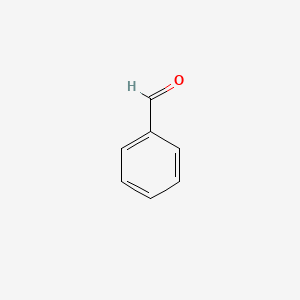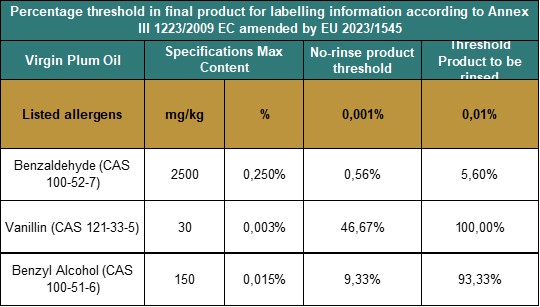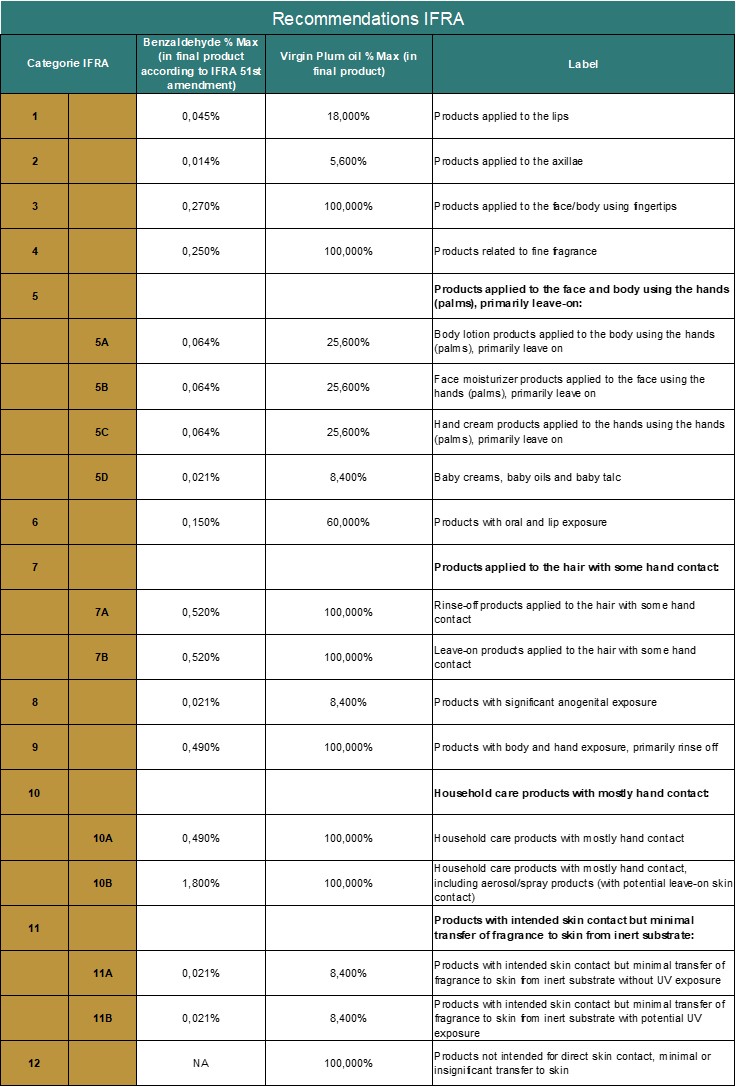Our company’s virgin plum (Prunus Domestica) almond oil, produced from upcycled almonds from the local plum industry in southwest France, is distinguished by its unique olfactory profile. This characteristic fragrance is primarily attributable to the natural presence of benzaldehyde, an organic compound whose in-depth understanding is essential for its informed use in the cosmetics sector.
Characterization and Origins of Benzaldehyde
Benzaldehyde (CAS No. 100-52-7) is an aromatic aldehyde with the chemical formula C7H6O.
Its molecular structure consists of a benzene ring substituted by a formyl group (−CHO). It is a colorless to pale yellow liquid with a characteristic bitter almond odor.


Benzaldehyde has various origins:
Natural Origin : It is present in the kernels of many Rosaceae, such as almond (Prunus dulcis), apricot (Prunus armeniaca), cherry (Prunus avium), and plum (Prunus domestica). It is released by enzymatic hydrolysis of cyanogenic glycosides, such as amygdalin. The concentration of benzaldehyde in our virgin plum kernel oil is a direct reflection of its natural presence in the kernel kernel.
Industrial Origin : Benzaldehyde is also produced synthetically on a large scale by various methods, including the oxidation of toluene, chlorination and subsequent hydrolysis of benzylidene chloride, or by the formylation of benzene (Gattermann-Koch reaction). Synthetic benzaldehyde is widely used as a flavoring in the food industry and as an intermediate in the synthesis of various organic compounds.
Applications of Benzaldehyde
Beyond its use as a perfuming agent, benzaldehyde finds applications in various fields:
Cosmetic Industry : Mainly used as a fragrance ingredient to impart almond notes.
Food Industry : Used as an artificial almond flavor.
Pharmaceutical Industry : Intermediate in the synthesis of certain drugs.
Agrochemical : Precursor to certain pesticides and herbicides.
Organic Synthesis : Versatile reagent for the production of a wide range of organic compounds.
Allergenic Potential and Regulatory Restrictions
Studies have shown that Benzaldehyde can cause skin reactions in some sensitive individuals.
As a result, Benzaldehyde has been included among the 54 new allergens in Annex III of the European Cosmetic Regulation 1223/2009 EC amended in 2023 by this addition, with EU Regulation 2023/1545.
As cosmetic products are subject to strict labelling rules, in accordance with European Cosmetic Regulation (EC) No. 1223/2009, the presence of one or more allergens must be indicated on the finished product label if the thresholds of 0.001% or 0.01% are exceeded for leave-on or rinse-off products respectively.
Furthermore, the International Fragrance Association (IFRA) issues recommendations, for safety purposes (restrictions, prohibitions) concerning the use of certain molecules in perfumes and cosmetic products (IFRA Standards). The 51st amendment to these standards was published in January 2024.
These recommendations may include maximum concentration restrictions in finished products to minimize the risk of sensitization and allergic reactions.
Benzaldehyde has been subject to restrictions since 2020, applicable since February 2021 for new products, and February 2022 for existing products.
It is imperative for formulators to consider these guidelines when using natural ingredients containing Benzaldehyde, such as our Virgin Plum Almond Oil.
Our Approach: Responsibility and Communication
Following these new regulations, all our products have been analyzed in order to establish the complete profile in relation to the allergens cited in regulation 1223/2009.
It appears that virgin plum oil naturally contains Benzaldehyde, which is largely responsible for its aromatic profile. Our documents have therefore been updated with this new information, and we can offer the following usage grid to our customers, in line with the labeling requirements of the European regulation:

Regarding IFRA recommendations, the following table gives the recommended contents for virgin plum oil and Benzaldehyde depending on the type of finished product, in order to remain below the thresholds prescribed by IFRA for Benzaldehyde:

We have been producing organic virgin plum oil and plum stem oil for 25 years and these two products, widely used as cosmetic ingredients throughout the world, have never given rise to any known allergic reaction.
Virgin plum oil is also recognized by the Cosmetic Ingredient Review as an absolutely safe and harmless ingredient.
However, in light of this new regulation, we also want to provide tangible and objective safety data. This is why we commissioned an independent laboratory to conduct a study on these issues, the results of which will be the subject of a new communication in a few weeks.
Our commitment to transparency and the safety of our ingredients is paramount.
In conclusion, Benzaldehyde is a key component in the aromatic profile of our virgin plum almond oil, reflecting its natural origin. Although valuable for its olfactory properties, its allergenic potential requires responsible management and transparent information to ensure consumer safety and regulatory compliance for cosmetic products.
References:
Regulation (EC) Annex III No 1223/2009 of the European Parliament and of the Council of 30 November 2009 on cosmetic products, amended by EU 2023/1545.
IFRA Standards. (Available on the International Fragrance Association website).
